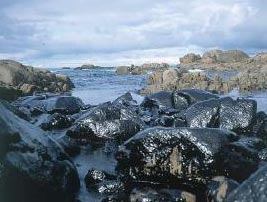
A Year Later, Prestige Oil Spill Continues
 |
|
|
 A
year after the Prestige oil tanker sank off the northwestern coast of Spain, the ecological and economic crisis caused by the massive oil spill is far from over, according to a new report by the World Wildlife Fund. The organization says that despite claims by the Spanish government that the affected area is recovering well, both the local marine environment and the fishing sector continue to suffer the aftereffects of the spill.
A
year after the Prestige oil tanker sank off the northwestern coast of Spain, the ecological and economic crisis caused by the massive oil spill is far from over, according to a new report by the World Wildlife Fund. The organization says that despite claims by the Spanish government that the affected area is recovering well, both the local marine environment and the fishing sector continue to suffer the aftereffects of the spill.
"If the government continues to declare that the situation is under control this looks like a cover up rather than a clean up," said report author Raśl Garc’a of WWF-Spain and author of the report. "Until now, the Spanish government's management of the catastrophe has neither been driven by environmental criteria nor been transparent." The Prestige -- a Bahamian owned, Greek operated oil tanker -- sank some 75 miles off Spain's northwestern coast on November 19, 2002. The new study finds that some 71,000 tons of oil were spilled by the Prestige, some 60 percent more than initially estimated. Some 300,000 sea birds, mainly common guillemots, Atlantic puffins and razorbills, are estimated to have died from the oil spill. WWF's report notes that the ship is still spewing oil. In addition to the more than 14,000 tons of oil remaining in the wreck, there are still between 5,500 and 11,000 tons of oil drifting offshore and periodically landing on the coast. According to the report, damage to fishing and related economic sectors, tourism, and the natural heritage along nearly 2,000 miles of coastline polluted by the spill may last for more than a decade and cost approximately $5 billion, with society at large paying some 97 percent of it. Around 30,000 people in the fishery and shellfish sectors have been directly affected and some local fishermen's organizations reported an 80 percent drop in their normal catch after the fisheries were reopened The large quantity of oil that sank onto the bed of shallower coastal waters raises serious risks of contamination by toxic pollutants, WWF says. The report is critical of the Spanish government's proposed $12 billion recovery plan for Galicia. WWF says this plan puts too much emphasis on crude and rapid economic development, and is likely to increase Galicia's environmental problems rather than help the province recover from its damaged environment and resources. "WWF is also very concerned by the fact that total investment on research into the Prestige oil spill will probably not reach $10 million, compared with around $270 million for research into the impact of the Exxon Valdez spill," said Kathryn Fuller, president of WWF-U.S. The tragedy of the oil spill provides a unique opportunity to develop effective means to regenerate the damaged ecosystems and commercial resources, Fuller explained, but that opportunity looks as if it may be wasted. The international conservation group says the Prestige spill should be used to reinvigorate efforts to strengthen maritime safety legislation to minimize the risk of such a crisis happening again. "WWF urges the shipping nations -- through the International Maritime Organization -- to identify the world's most sensitive and vulnerable areas, with the aim of declaring them Particularly Sensitive Sea Areas," said Simon Cripps, Director of WWF's Endangered Seas Programme. "Such areas, in conjunction with stricter shipping regulations, will help reduce the impact of further oil and other spills." Six such areas have been formally accepted by the International Maritime Organization: the Florida Keys; Australia's Great Barrier Reef; Cuba's Sabana-Camaguey; the Wadden Sea, along the coast of Denmark, Germany, and the Netherlands; and Peru's Paracas. Two additional areas have received provisional acceptance and will be accepted in June 2004 -- the Torres Strait of Australia and Papua-New Guinea, and the Western European waters, which touch Belgium, the United Kingdom, Ireland, France, Spain and Portugal.
Albion Monitor
November 5, 2003 (http://www.albionmonitor.net) All Rights Reserved. Contact rights@monitor.net for permission to use in any format. |